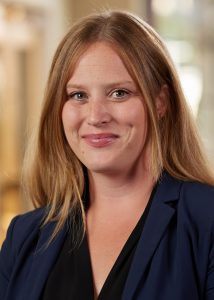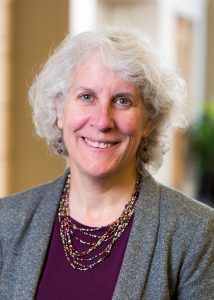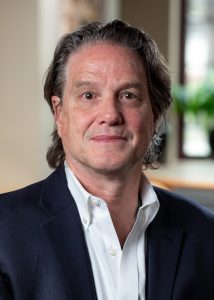
Asst. Professor Natalie Netzel ’15
When Natalie Netzel was deciding which law school to attend, she kept coming back to the school that promised her “practical wisdom” that would make her ready to practice when she graduated. A large part of the pull was the clinical education that would give her real-world legal experience while still in law school.
Ten years after making her choice, Netzel will become one of two co-directors of the very clinics that drew her to attend Mitchell Hamline.
Starting July 1, Netzel, along with Professor Kate Kruse – who has more than 30 years’ experience in clinical programs at five different law schools – will helm the program that began 50 years ago as one of the nation’s first clinical education programs.
“This is an exciting opportunity to help shape the future of Mitchell Hamline’s clinical program,” said Netzel ’15, an assistant professor. “The clinics do incredible legal work serving clients and organizations that otherwise lack access to legal representation.
“It is an honor to have a role in leading something that is so much bigger than any individual involved.”

Professor Kate Kruse
For Kruse, this marks a return to the role of clinics director, which she held at Hamline University School of Law before its 2015 combination with William Mitchell. Kruse is also a previous associate dean and vice dean at Mitchell Hamline. “I look forward to looking back on our history, taking stock of where we are now, and planning where we want to go in the future,” she said.
“I can’t wait to see the work professors Kruse and Netzel bring to these posts,” said President and Dean Anthony Niedwiecki. “We’ve had remarkable leadership during the clinics’ first half century, and I know Kate and Natalie will shepherd us well into the next half century.”
Kruse and Netzel will succeed Professor Brad Colbert ’85, who remains director of the Legal Assistance to Minnesota Prisoners (LAMP) Clinic. Colbert has been the clinic director since 2017.

Professor Brad Colbert ’85
“I’m grateful to have had the chance to lead the clinics these past years,” said Colbert. “It’s been an absolute delight working with everyone involved in the clinics – students, faculty, and staff. I am really looking forward to working with Natalie and Kate and see great things in the future of our clinics.”
Mitchell Hamline currently has 15 clinics whereby students work with clients, under the supervision of professors. Students gain real-world experience by representing their clients in any number of ways. Students have won expungements and pardons for clients; testified before lawmakers to advocate for policy changes; and advocated on behalf of their clients in court.
“I’m thrilled that Natalie and Kate will be stepping into leadership of the clinical program,” said one of the clinic instructors, Associate Professor Ana Pottratz Acosta, who heads the Medical Legal Partnership. “The combination of Kate’s years of clinical teaching experience and leadership combined with Natalie’s innovative work and scholarship make them the perfect team to lead the clinical program.”
In summer 2021, the physical space where most clinics are located – the Rosalie Wahl Legal Practice Center – underwent a complete overhaul, thanks to a gift from the estate of Peter Berge ’83. The new space combines offices for faculty with common areas and meeting rooms for students and clients.
Netzel says she hopes to add emphasis on a newer field of study around what it means to be a trauma-informed lawyer. “People usually need lawyers at the worst moments of their lives, and I want to make sure our students are well-equipped with the necessary skills to adequately address clients’ needs beyond knowing and understanding the law,” she said. “Trauma-informed lawyering skills are just as critical as other lawyering skills.
“To be the best lawyer one can be, a person needs to be healthy—and mental health is health. In clinic, we have an opportunity to be proactive and create support networks before problems arise.”
In addition to that work, Kruse believes clinics will do even more work in coming years to deepen partnerships with community organizations and policy makers. “We take pride in the legacy of having been a leader in clinical education for many years–starting at a time when not all law schools had clinical programs,” said Kruse. “Now, all law schools have clinics, but they are all different.
“I am really proud of the many ways our clinic program embodies the school’s larger mission of access, social justice, and innovation.”
